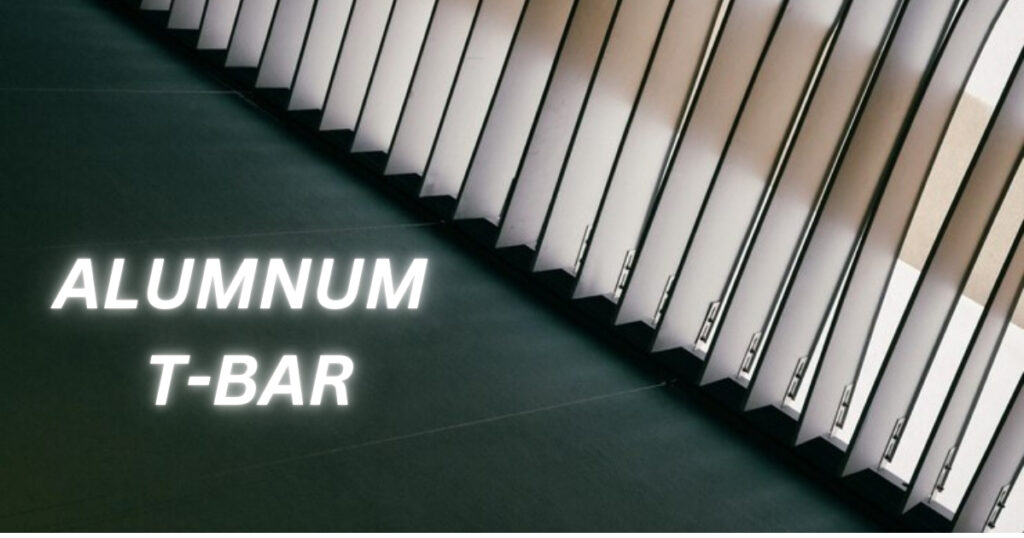alumnum t-bar have become an indispensable material in modern construction, design, and manufacturing. Known for their lightweight yet durable properties, they are widely used across various industries. But what makes aluminum T-bars so popular? Let’s dive deeper into their features, applications, and benefits.
What Is an Aluminum T-Bar?
An aluminum T-bar is a type of extruded aluminum profile shaped like the letter “T.” This unique design provides excellent structural integrity, making it ideal for applications requiring strength and stability without adding unnecessary weight.
Features of Aluminum T-Bars
Aluminum T-bars offer a host of features that make them stand out in the market:
Lightweight: Aluminum is naturally light, making T-bars easy to transport and handle.
Corrosion Resistance: The metal resists rust and oxidation, ensuring longevity even in harsh environments.
Customizability: Aluminum T-bars can be cut, drilled, or welded to fit specific needs.
Aesthetic Appeal: Their sleek, metallic finish enhances the look of any project.
Common Sizes and Variations
Aluminum T-bars come in various sizes, ensuring compatibility with different applications. Standard sizes range from small profiles suitable for detailed work to larger sections designed for heavy-duty construction. Custom sizes are also available to meet unique project requirements.
Applications of Aluminum T-Bars
Construction Industry
Aluminum T-bars are widely used in construction due to their strength-to-weight ratio. They serve as support beams, framework for ceilings, and even decorative elements in modern architecture.
Interior Design
In interior design, T-bars are often used for creating sleek, minimalist designs. From partition systems to trim accents, they add a modern touch to homes and offices.
Automotive and Aerospace
The automotive and aerospace industries rely on aluminum T-bars for their lightweight and durable properties. These profiles are used in structural components to enhance performance and efficiency.
Manufacturing
Aluminum T-bars play a vital role in manufacturing machinery, conveyor systems, and equipment frames. Their versatility makes them a go-to material in industrial settings.
Marine Applications
Thanks to their corrosion-resistant nature, aluminum T-bars are ideal for marine environments. They are commonly used in boat building and dock construction.
Benefits of Using Aluminum T-Bars
Lightweight Yet Strong
Aluminum T-bars combine lightweight properties with impressive strength, making them perfect for projects where weight reduction is critical.
Corrosion Resistance
Unlike steel, aluminum does not rust, making T-bars suitable for outdoor and marine applications.
Easy to Work With
Aluminum T-bars are easy to cut, weld, and machine, reducing labor costs and time.
Sustainable Material
Aluminum is 100% recyclable, making T-bars an environmentally friendly choice.
Cost-Effective
Despite their many advantages, aluminum T-bars are relatively affordable, offering great value for money.
How to Choose the Right Aluminum T-Bar
Consider the Application
Before choosing an aluminum T-bar, identify its intended use. For heavy-duty applications, opt for thicker profiles with higher strength.
Check Dimensions
Ensure the T-bar’s dimensions fit the specifications of your project. Precision is key to achieving the desired results.
Evaluate Finishes
Aluminum T-bars are available in various finishes, including anodized, powder-coated, or mill finishes. Choose the one that best suits your aesthetic and functional needs.
Budget Constraints
While aluminum T-bars are cost-effective, prices can vary based on size and finish. Balance quality with budget to make an informed decision.
Maintenance Tips for Aluminum T-Bars
Regular Cleaning
Clean aluminum T-bars regularly to remove dirt, grime, or salt deposits, especially in marine environments.
Inspect for Damage
Check for scratches or dents that may compromise the structural integrity of the T-bar.
Apply Protective Coatings
Consider using protective coatings to enhance durability and resistance to environmental factors.
Popular Alternatives to Aluminum T-Bars
Steel T-Bars
Steel T-bars offer greater strength but are heavier and prone to rust.
PVC Profiles
PVC profiles are lightweight and corrosion-resistant but lack the strength of aluminum.
Wooden Beams
Wood is a traditional choice but requires significant maintenance and is less durable compared to aluminum.
Environmental Impact of Aluminum T-Bars
Aluminum T-bars are a sustainable choice, thanks to their recyclability. Manufacturing processes are continually improving to reduce energy consumption, making them an eco-friendly option for green projects.
The Future of Aluminum T-Bars
With advancements in technology, the use of aluminum T-bars is expected to grow further. Innovations in alloy composition and production techniques will likely enhance their strength, durability, and overall performance.
Conclusion
Aluminum T-bars are a versatile and reliable solution for a wide range of applications. From construction to interior design, their lightweight, corrosion-resistant, and cost-effective nature makes them a top choice for professionals and DIY enthusiasts alike. By understanding their features, benefits, and maintenance requirements, you can make the most of this incredible material.
FAQs
What is the main advantage of aluminum T-bars?
The main advantage of aluminum T-bars is their lightweight yet strong nature, making them ideal for various applications without adding unnecessary bulk.
Are aluminum T-bars rust-proof?
Yes, aluminum T-bars are corrosion-resistant and do not rust, even in humid or marine environments.
Can I weld aluminum T-bars?
Yes, aluminum T-bars can be easily welded, cut, and machined to suit specific project requirements.
Are aluminum T-bars eco-friendly?
Absolutely! Aluminum is 100% recyclable, making T-bars an environmentally sustainable choice.
Where can I buy aluminum T-bars?
Aluminum T-bars are available at hardware stores, online retailers, and specialized metal suppliers.







